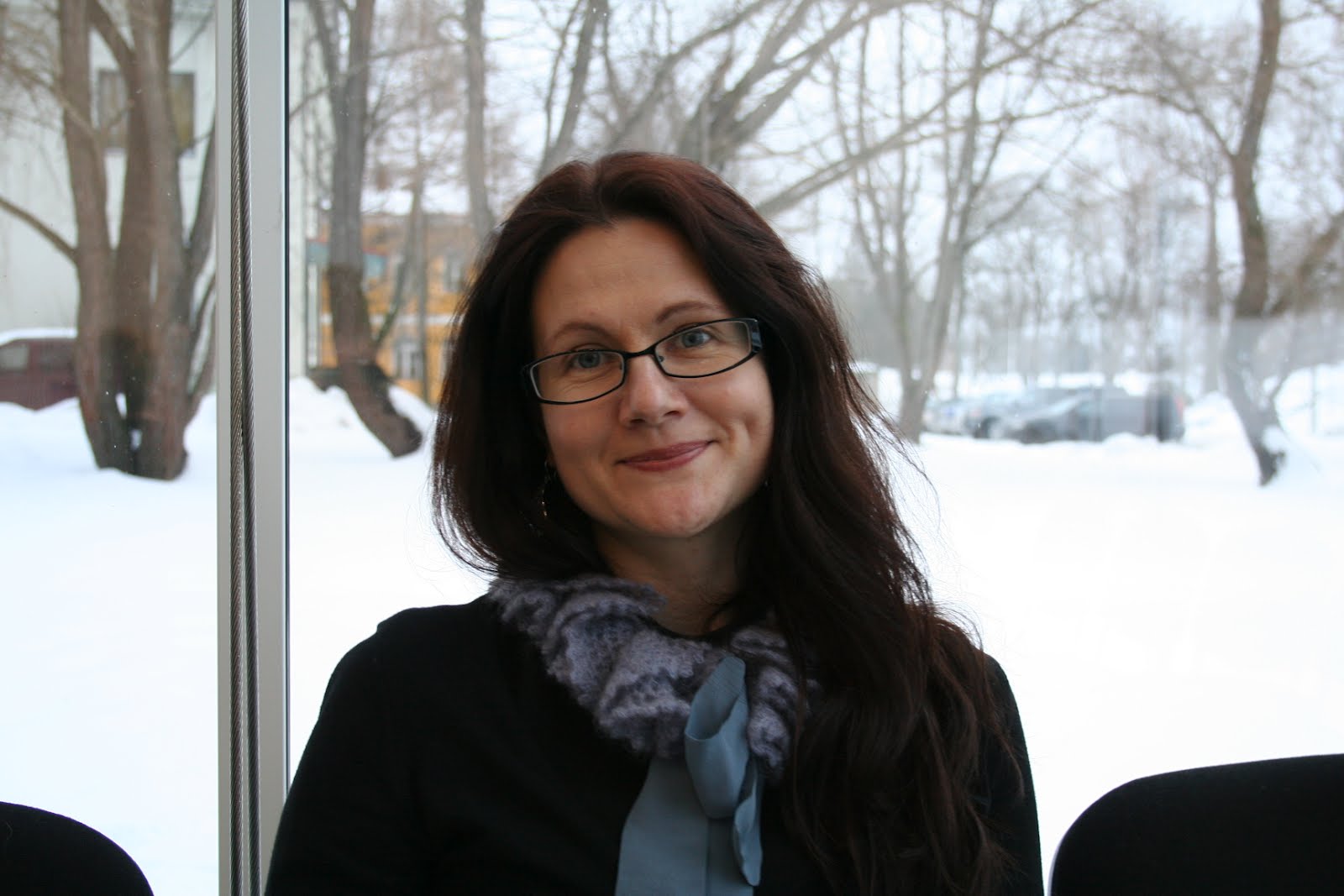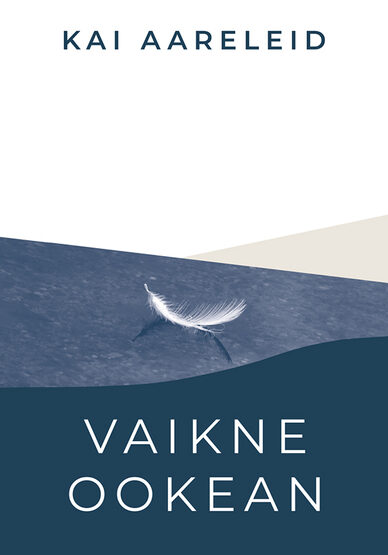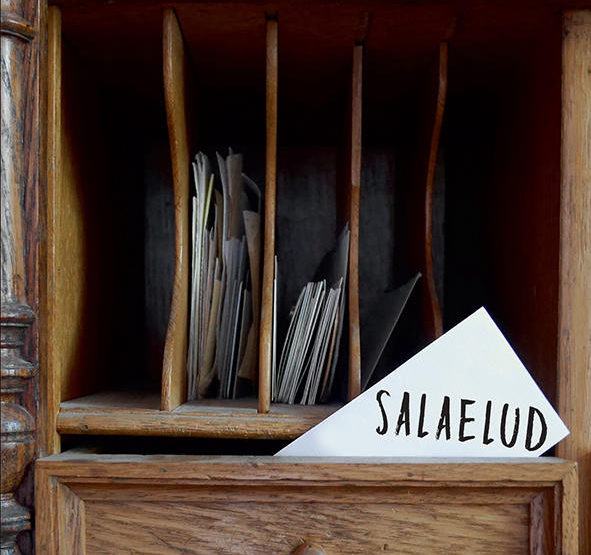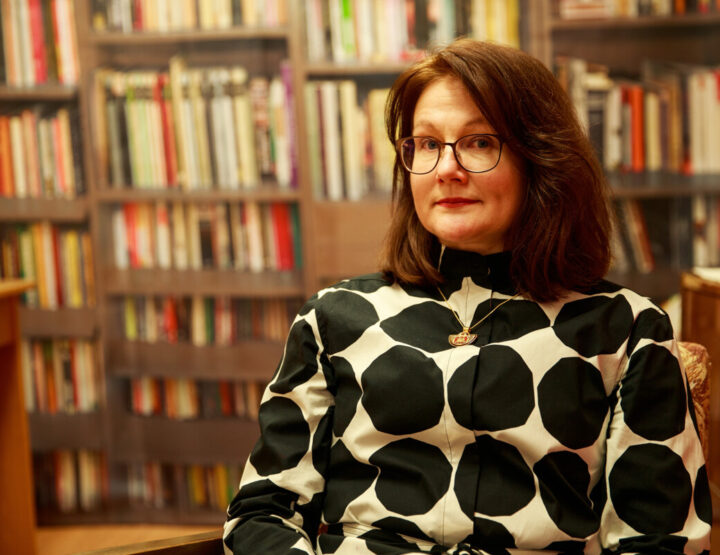Kai Aareleid (1972) and Veronika Kivisilla (1978) are writers whose works have, in a way, recently debuted. Both published their first literary works in 2011: Kai the semi-autobiographical novel Vene veri (Russian Blood), and Veronika the poetry collection Kallis kalender (Dear Calendar). Before their respective releases, Kai had written short stories and translated Spanish, Portuguese, Finnish, and English literature into Estonian, while Veronika was involved in music, teaching, and storytelling.
As of today, however, one can’t miss how boldly both women’s voices have started to ring out in Estonian literature: Veronika’s third poetry collection Cantus firmus (2015) was nominated for the Cultural Endowment of Estonia’s Award for Poetry, while Kai’s second novel Linnade põletamine (We All Fall Down, 2016) can be regarded as one of the year’s most important Estonian-language works of prose. Additionally, they are widely known for their impressive stage presence. ELM reckoned that it’s the right time to have them interview each other.
Veronika Kivisilla’s questions for Kai Aareleid.
Try to remember where it all started, describe what you read as a child, and what you carry around to this day. Did you feel back then like the pencil was winking at you slyly? When were your first attempts at writing literature? Do you still have any of them, or do you have any memorized?
Answering questions like that is always a little embarrassing. How original can anyone’s response really be? Looking back, maybe only two things are worth mentioning. Firstly, I was read to a lot as a child, and I myself became a reader at a relatively late age. I remember many situations where I was being read to, and sometimes I can recall external details, such as the lighting or background noises, much more clearly than what was being read. In hindsight, I’ve realized how deep an impression the memory of having someone reading aloud has left on me: I spent a lot of time in a sleepy little town in central Estonia as a child, and I can clearly picture my grandfather reading my grandmother’s favorite books to her in bed in the evenings. My grandmother would listen and I would listen (probably not understanding all that much), and we would both fall asleep to the sound. I like to think that it’s all stored somewhere in my memory and has been just as fertile as the books I read later.
Another important moment was when I became conscious of language. It happened in school, when I already spoke a couple of foreign languages to some extent. At some point, I realized that many of the wonderful books I was reading were available to me thanks to the fact that someone had translated them into Estonian, word for word, thought for thought, so that in the end you couldn’t perceive the original language anymore. The discovery was revelatory, especially when I’d had the opportunity to experience the joys and pains of studying a foreign language for myself. It’s possible that’s the reason I later became a translator was my delight in playing with words.
It’s always interesting to hear about another author’s writing process. From what I gather, you always review your own texts personally, repeatedly, and with a heavy and scrupulous hand. But again, from the beginning: does a story you find stare you straight in the face right away, and is it either poetry or prose? Is it a lucid flash or, rather, murky contours that come into focus over time? Torment, agony, quests, or a fluid and painless rush of ink? Systemic writing, a definite routine, or still moments that alternate with writing gusts? And, lastly, how much do you weed out or rearrange? Are some things occasionally ready even without editing? What’s it like with prose? What’s it like with poetry? Compare, for example, the stories of how your two novels and your two poetry collections came about…
Both editing and translating, which is my other job besides writing, teach me to see and avoid overwritten texts. For the most part, I suppose I don’t re-write as much as I “peel” a text, trying to free it of everything excessive. It’s possible this is also because I began with shorter forms of prose; with novellas.
To me, it’s clear more or less immediately whether a long or short work of prose is taking shape. In the beginning, it certainly might be difficult to decide whether one storyline, whether one character’s story is a part of that same story, or whether it is something entirely of its own. On occasion, a splinter of a longer story is left over and later becomes a novella. At the same time, it’s sometimes hard for me to choose whether an idea should become a poem or a short story. Since I see myself more as a prose writer, I suppose I can honestly admit that some of my poems are more like short stories left unfinished due to a lack of time.
With prose, I structure and polish up to the last second. This is much less the case with poetry: those texts are essentially already rewritten once, because I write them down in a notebook first. Most of my first collection of poems was written during early mornings at my cabin, sitting on literally the very same stump. My second collection emerged on trips, carrying a notebook in my travel bag. My novels have taken shape very differently, too: the first happened rapidly, while the second presented itself to me very slowly, and I carried it inside of me for quite a long time.
Lately, it’s certainly been the case that when it’s “writing time”, I just sit and write; there’s no room for agony if the clock is ticking and non-renewable resource – time –
is running out. It’s possible that you learn that through living: when you’re young, you think there’s always more time, but at some point you realize that there might not be. You’re able to take a break from one activity by doing another. I’ve learned that while translating and editing I can effectively rest from writing, and can, for the most part, also learn a thing or two about it; I can even rest from one story by working on another. When writing long works of prose, there are always moments where you hit a rut or feel like the end isn’t in sight. At those points, it’s worth completing some shorter story in the meantime, where the outcome can be seen immediately. There are also dead points, naturally: over time, you simply learn to outsmart yourself. And all of this, of course, doesn’t mean you shouldn’t just watch the clouds go by for a while.
Especially in the case of your latest novel, Linnade põletamine, something that probably stands out to readers right away is your pictorial manner of writing. You’ve said that pictures are the very way in which you think and see the world. What might the benefits of this writing style be? Does it help to hold a longer prosaic text’s story together? What, overall, simply makes prose good prose, in your opinion?
The fact that I write in pictures may stem from my training as a playwright, but just as well might come from the fact that I see and remember the world foremost in pictures; in frozen moments. Memories are like pictures in a photo album: fragments dusted off or held up to the light for a moment, ones which acquire association and meaning only when they are shoved into order.
With both of my novels, by the way, old photographs have been not only important starting points, but also sources: they’ve helped me to determine tiny details and capture the right atmosphere. Photos can bring unexpected memories to the surface. In purely practical terms, a photo can help date one event or another – documents may be spotty, human memory selective, but a precisely dated photograph doesn’t lie so easily. In Linnade põletamine, one minor character says something like this: “I’ve always said you should photograph your things; memory can’t be trusted.” I think that’s true, but since I’m not a photographer, I try to “photograph” with words.
It appears that my next novel will also be a photo album in its own right. At the same time, I think and hope that a writer does change and develop while writing. Some part of your nature certainly remains, but each specific story dictates a part of your style.
In prose, I appreciate linguistic surprises and sensual precision: frequently, the measure for this is whether I feel the urge to read with a pencil, so to speak, to take notes, to learn something, or not. I’ve striven to translate foreign authors with whom I get that urge: Javier Marías, Enrique Vila-Matas, Roberto Bolaño… Translating is one of the most thorough methods of reading, and allows you to live in a story’s world for somewhat longer than merely reading it. Fluidly written and masterfully woven stories are sometimes a great pleasure to read, too, but for me very good prose is something that persists in your mind a great deal later. It’s usually an emotional charge or an explicitly described atmosphere, some chafing detail or a very well-played-out scene, no matter whether it’s funny or tragic, and best if it is both.
Talk a little about the title Linnade põletamine. What, for you, are the book’s main themes?
There are multiple layers within the novel’s Estonian-language title. First of all, a connection to playing cards: linnade põletamine [literally “burning of cities”, Estonian –
Trans.] is one of the simplest card games you can play, and is known in English as War, in French as Bataille, and in German as Leben und Tod. It is almost an endless game guided solely by chance. The human lives in my story are also greatly under the influence of chance.
Lives and bridges are burned to the ground in Linnade põletamine, and it all takes place in Tartu: a town that was nearly razed by fires in World War II, and in the 1950s and 1960s was still pockmarked with ruins and gaping holes. The protagonist Tiina, who over the course of the story grows from a girl into a young woman, is surrounded by empty places both out on the town streets and within the walls of her home.
On the one hand, Linnade põletamine is a novel about waning love, the reduction of a marriage to silence, unasked questions, secrets, lies, and addictions; on the other, it is the story of one child’s loneliness, which is made that much greater by the fact that on the surface her life isn’t lacking anything. Generally, I suppose the book discusses what might be used to fill emptiness in both a literal and a figurative sense. Emptiness can be filled with games: a card game, for instance. In Linnade põletamine, playing cards is simultaneously secrecy, entertainment, escape, and a joiner and divider of people.
As a translator, I naturally realize that it’s impossible to translate all these layers into another language: inevitably, one shade of meaning or another will have to be abandoned, or the translator will have to think “outside the box”, which is an interesting challenge for both the translator and the author.
In the book, Tiina is an exceptionally independent and unbelievably reasonable child. At moments when any of her peers would slam doors, she instead understands and forgives. She’s able to keep secrets. Do you know a girl like that? Is that what you yourself are like? And your own four children: how difficult or easy is it for you to perceive the world of today’s youth, of today’s teenagers?
Independence and reasonableness are sometimes the only way to survive: having a certain kind of defense mechanism. I do know some unbelievably reasonable children very well, and so Tiina is quite a realistic character, in that sense. There’s not much of me in her. I probably wasn’t that reasonable as a child, nor did I have such a dramatic childhood. If anything, a few of the book’s sub-plots and supporting characters are from my childhood.
As for the world of today’s children – well, the basics haven’t changed; major dramas and major joy still come from the same sources. I do believe that there are more opportunities, which has made some things too easy or taken for granted. On the other hand, there is less false shame, which makes many things easier and more natural.
The Chinese are said to have a curse: may you live in an interesting time. In my opinion, we live in an interesting time; we’ve seen several different power structures and rather giant leaps. Our children are living in an interesting time in a different way, and they’re incredibly fascinating to be around. Although I taught my children how to eat with forks and how to read, they teach me something by their example every day, something that’s at least as important.
What other works that echo post-WWII Estonia do you appreciate, and why? Were they an archetype for or an obstacle to writing Linnade põletamine?
What’s odd is that it is difficult for me to think about “echoing post-WWII Estonia” with my book at all. For me, the story is essentially set in the 1950s and 1960s. I was intrigued by the ghostly proximity and concurrent distance of that “previous time” (and previous lives), since a great rift had occurred (the war), and power and government had changed.
What is important in Linnade põletamine is not so much the distresses of a major history, but the twists and turns of a minor history. The novel is primarily about the foolish and unavoidable burning of lives and fates, about the timeless tangled messes of human lives, about the way in which we all fall down, no matter what good intentions we might have, and about how to get back on your feet again: how to survive after losses.
I’ve naturally read the “compulsory” literature (although I didn’t re-read it when writing this book; rather, I tapped into the necessary information and atmosphere from old newspapers, photo albums, and memoirs). At the same time, however, I believe that Linnade põletamine is more closely aligned with books that describe Time in general, not a specific era. Hopefully, it can still be seen more as a human drama, and not only as a period drama.
With the post-war years, I was most interested in “miscellaneousness”. Even then, during the poor era of the 1950s in Estonia, recovering from the wounds of war, there were different kinds of lives: some people felt guilty because they hadn’t been deported, or because they lived a relatively wealthy lifestyle in the face of general poverty. Friendships between Estonians and Russians were also uncommon: the friendship between nations was being cultivated superficially, but if an Estonian girl found a friend and companion in a Russian boy, then the situation was considered improper, even though friendship – like love – knows no ethnicity.
One thing I’ve noticed in life is that if bombs aren’t falling and lives aren’t in direct danger, then people simply live their lives: they fall in love, betray, play in both the literal and figurative sense of the word, trip, fall, and waste their lives: they’re human. That is the minor history which intrigues me.
You and poetry. For those who knew you as a prose writer and a translator, your two collections – published in succession – no doubt came as a surprise. Have you been a secret poet for a long time, or were you yourself surprised by the sudden and irresistible compulsion? And what compulsion was it, in the first place? What kind of an experience is it for you to stand up before an audience as a poet? How do you feel on stage? What do you think is important when interacting with an audience?
Naised teel (Women on Their Way) and Vihm ja vein (Rain and Wine) were both compiled with pretty fresh texts. There are waves in a writer’s creative process, just like there are in life. There’s no point fighting the waves: it’s wiser to go with the flow. I suppose that my intense work on the novel and poetry, with its succinct style, were different enough to fit together nicely. So, it simply happened: those ideas and stories found themselves in prose-poetry form.
One of poetry’s most enjoyable means of expression is the opportunity to perform it on stage, to turn the writer into a performance artist. I like to perform both my own texts and others dear to me – for the most part, my own texts sound in my head like they could be read out loud, and therefore it’s especially interesting to perform “as my own” the kind of text which I would personally never write, but which speaks to me and that I’d like to share with the audience.
Writing is lonely work; audience feedback filters in slowly and in tiny flecks. I don’t believe a writer who claims that feedback doesn’t matter. Whether or not he or she takes it to heart or is shaken by it is another thing, but feedback really is necessary and beneficial. During a live performance, there is immediate feedback in the form of that energy which forms between the performer and the audience. My education was in theater and I studied to be a dramaturg, but I haven’t worked a single day in a theater. Strangely, performing prose and poetry have helped me remember what once drew me to the theater, and to realize that my theater education hasn’t rolled off me like water off a duck’s back, and that maybe stage-poetry and stage-prose really are my path in the theater world.
What do you dream about, on the literary level and otherwise?
If dreaming means not having two feet on the ground, then I’m incapable of dreaming much on a literary level. Since all areas of my day job are associated with bookmaking, a clear picture of the abundance prevalent in the book world is constantly in front of me. This disciplines and reminds me that there’s only a point in adding something to that abundance if you really have no other choice. I very much like Rilke’s advice in Letters to a Young Poet: to ask myself in the deepest hour of night whether I must write; only if the response comes confidently and as a yes should I then adapt my life to that inevitability.
There are, however, two or three people in my life with whom I can spin yarns, who are prepared to story-tell irresponsibly with me. That’s probably the closest to dreaming: it’s incredibly fun, and very few of those storylines end up becoming written stories: they remain dreams.
Otherwise, though, I dream about little things, and also dream about dreaming – about having time and places and peace.
*Foto: Jaak Urmet





